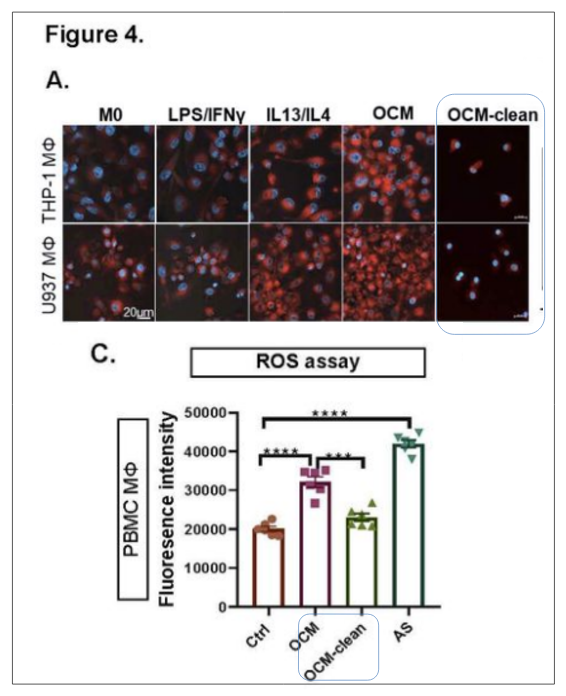|
Cleanascite™ Employed to Investigate Lipid Influence in Tumor-associated macrophages (TAMs) Biotech Support Group reports on an article, describing the simplicity and efficiency of their lipid clearance technology for depletion of lipids from omental conditioned medium (OCM) to determine their influence on tumor-associated macrophages (TAMs) News Release
Cleanascite™ Employed to Investigate Lipid Influence in Tumor-associated macrophages (TAMs)
MONMOUTH JUNCTION, NJ, January 9, 2023 -- Biotech Support Group reports on an article, describing the simplicity and efficiency of their lipid clearance technology for depletion of lipids from omental conditioned medium (OCM) to determine their influence on tumor-associated macrophages (TAMs)
Chan, David, et al. "Polyunsaturated Fatty Acids Promote Protumoral Macrophage Polarization via a RhoA-YAP1 Signaling Pathway in the Ovarian Cancer Microenvironment." (2022).
“… Similarly, we demonstrated that the cellular ROS levels in OCM/AS-MΦs derived from PBMC MΦs were significantly upregulated, whereas the addition of Cleanascite™ mitigated the increased malignant ascites microenvironment (MAM)-mediated ROS level, indicating that the accumulation of UFAs in the MAM is responsible for the enhanced ROS production in TAMs (Fig. 4C). … Here, we further found …removal of lipids by Cleanascite™ remarkably prevented the reduction of YAP1 in OCM-MΦs (Fig. 5F), implying that the lipids within MAM facilitates protumoral M2-like TAMs polarization through the regulation of RhoA-YAP1 signaling cascade.” The article concludes that PUFAs are a key player in promoting tumor-infiltrated TAMs polarization that, in turn, facilitates EOC tumor growth and metastasis.
Link to view our case study, Lipid Removal for Phenotypic Cell Response in Cancer Research (biotechsupportgroup.com)For
more information visit: Cleanascite™
Lipid Removal Reagent and Clarification,
at
Keywords: Tumor-associated macrophages (TAMs), Macrophage polarization, omental conditioned medium, Cleanascite™, polyunsaturated fatty acids (PUFAs), malignant ascites
About Biotech Support Group LLC Converging with cultural and technological disruptions forthcoming in healthcare, Biotech Support Group develops methods for cost effective and efficient sample prep essential for these expanding markets. Following a tiered business strategy, the company continues its growth in the consumable research products area supporting the rapidly expanding installation of LC-MS instrument and computational infrastructure. For this market, key products include: AlbuVoid™ and AlbuSorb™ for albumin depletion, Cleanascite™ for lipid adsorption, HemogloBind™ and HemoVoid™ for hemoglobin removal. From these innovations, the company has acquired knowledgebase and biomarker intellectual property assets that support discoveries of protein markers from blood, with special emphasis on early detection and personalized medical decisions for cancer patients. For more information, go to http://www.biotechsupportgroup.com. For Business Development, contact: Matthew Kuruc 732-274-2866, mkuruc@biotechsupportgroup.com |

- About
- Products
- Hemoglobin Removal Kits
- Lipid Removal & Clarification
- Urine Protein & Low Abundance Enrichment
- Class Specific Enrichment
- Sample Prep Mass Spectrometry
- Functional & Chemical Proteomics
- Genomic Sample Prep
- Accessories
- Technical Resources
- References
- Publications & Reports
- FAQs
- Case Studies
- Cleanascite™ Unlocks Insights into Lipid-Driven Tumor Immunosuppression
- NRicher™ Bead Platform Provides Unique Sub-Proteome Biases And Fit For Purpose Opportunities for Targeted LC-MS Quantification
- BSG Products To Assist in Analyzing Macrophage Polarization
- Ectodomain Shedding and Enrichment of the Soluble Membrane Proteome
- Investigate out of the Venn Diagram box
- Methods to selectively deplete or purify Hemoglobin from Dried Blood Spots (DBS)
- The Utility of HemoVoid™ is Demonstrated in 3 Proteomic Investigations Identifying Potential Disease Specific Biomarkers
- The 4 common features of our sample prep products, known as the BSG Advantage, are highlighted in a selection of journal references.
- AlbuVoid™ Workflows Advance Cell Secretome Proteomics
- Lipid Removal for Phenotypic Cell Response in Cancer Research
- The Influence of Sample Prep Bias on LC-MS Targeted Peptide Quantification in Serum Proteomics
- Re-imagining proteomics for developing precision medicine biomarkers of the innate immune response in SARS-CoV-2
- Patent Application Describes New Proteomic Methods to Monitor Protease Inhibitor Function During Covid-19 Infections
- Efficient Hemoglobin Removal Advances Red Cell Proteomics Offering Many New Insights Into Inflammation and Infectious Disease
- The Potential for New Blood Biomarkers in the Management of COVID-19 Disease
- Establishing the Utility of HemoVoid™ and HemogloBind™ as Enrichment Tools for Proteomic Analysis of Red Cells and Whole Blood in Parkinson’s Disease
- Species Diversity Supported By BSG Products
- Poster Report Describes Loss of Functional Serpin Activity In Cancer Patient Blood
- AlbuVoid™️ PLUS & AlbuSorb™️ PLUS Evaluating Different Windows of Observation Solves The Many Challenges of Serum Proteomics
- Tackling the Challenges of Serum Proteomics
- Lipid Removal Sample Prep for Cell Response Applications
- Sample Prep for Proteomic Analysis of Saliva
- Biotech Support Group Featured in Book, "Functional Proteomics – Methods and Protocols"
- Sample Prep Liquid Biopsy Products Suitable for Proteomic Profiling of a Variety of Body Fluid Sample Types
- Albumin and High Abundance Depletion
- Using HemogloBind™ as a Hemoglobin Binding Reagent
- Diverse technologies available for researchers to selectively bind or enrich exosomes and extracellular vesicles.
- Stroma Liquid Biopsy™ Biomarkers Profile Pan-Cancer Dysregulation of the Serum Proteome
- Diverse Depletion and Enrichment Technologies Enhance Simplicity and Efficiency of Obtaining Quality Proteomic Information
- Use On-Bead Digestion to Improve Time Required for Serum Digestion
- Using AlbuVoid™ as a Serum Protein Enrichment Kit in Functional Proteomics
- Using Cleanascite™ as a Lipid Absorption and Clarification Reagent
- Using HemoVoid to Remove Hemoglobin Before Analysis
- Blog
- Contact
- Liquid Biopsy

.png) “
“